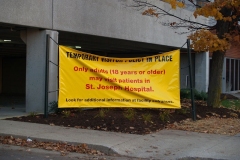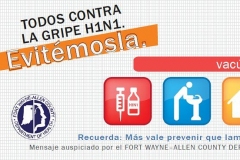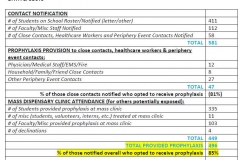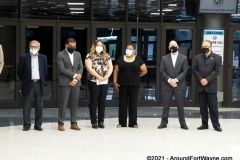![]()
Press release from the Fort Wayne-Allen County Health Department:
Questions and Answers regarding H1N1 and Schools
Why is H1N1 making so many children sick?
This is a new virus for which most people have had NO prior exposure to. That means people, especially children, have no natural immunity to fight it off. This particular virus seems to be attacking kids more severely than adults. The most recent statistics tell us that about half of the people sick enough to be hospitalized with severe symptoms are younger than 25 and about a quarter of all deaths were in the same age bracket. We are not used to seeing this age group get seriously ill and die from the flu. Generally, 90% of seasonal flu deaths are in elderly patients.How bad is the current situation?
Most schools districts are experiencing very high absenteeism, as high as anything in recent memory. It is not isolated to any one particular school or school system. These absenteeism rates are consistent with what you would expect in a pandemic situation.What should school officials be doing if there are students with “confirmed” cases of H1N1 in the building?
At this point, doctors are advising patients that if they have a fever and a combination of other symptoms including cough, sore throat, vomiting, diarrhea, body aches or other symptoms, that they likely have the flu. Nearly 100% of influenza cases in the area are H1N1. To say there is a “confirmed” case is misleading. The reality is there are people with H1N1 throughout the community, and we can expect it in almost every school building as well. A parent may also be told that any siblings of a child with fever and cough/sore throat stay home for five days as well. This is because the siblings may have been infected and are contagious but have not yet developed symptoms. We call this time period the incubation period. Once it passes and symptoms have not developed, then we know that the sibling(s) is not contagious.Why is the health department not recommending that schools close at this time?
The decision to close schools should always balance the risks of keeping students in school where they might be exposed to the virus with the social disruption that school dismissal can cause. Because we are likely to have ongoing H1N1 activity for the next several weeks, closing schools for a short period of time is not likely to have a significant impact on community-wide transmission. It would also make it difficult to determine when it was appropriate to open schools again. Unless children are quarantined at home, they will still likely congregate in other public places such as shopping malls and day cares and still continue to be exposed to the H1N1 virus. Of course, the decision to close schools could change if the severity of the illness changes.What is the health department advising schools to do at this point?
We continue to monitor school absenteeism closely and we are recommending that school officials continue to take precautions in every building to limit the spread of the illness. Those measures include:
- Making sure students and staff wash their hands and/or use hand sanitizer frequently
- Reminding students and staff to cover their cough and sneeze appropriately
- Monitor students and staff for fever and other symptoms of flu
- Separating ill students from others until they can be sent home
- Reminding parents to keep their children home when they are sick until at least 24 hours after they no longer have a fever, or signs of a fever, without the use of fever-reducing medicines.
Why isn’t the health department vaccinating children in the schools?
With the limited amount of H1N1 vaccine we have received to this point and the sporadic manner in which it is being delivered, it was not feasible to offer the vaccine in schools in a county as large as ours. At this point, there is just not enough vaccine available nor is there staff available to distribute it in all the buildings. We hope to receive more vaccine soon and will continue to look for ways to get it out to our community, both at our public vaccination clinic at Carew Medical Park and through private providers such as family practitioners, pediatricians or pharmacies. Please stay tuned to local media, visit www.FightTheFlu.org, or call 2-1-1 for updates on vaccine availability.Why are teachers not considered a high priority group to get vaccinated?
A lot of people will be at risk for getting this flu based on their occupation, but the priority groups established by the U.S. Centers for Disease Control and Prevention were based on who had a higher risk for serious complications, including being hospitalized or even dying. At this time, those priority groups include children and young adults, pregnant women and health care providers. Caregivers of infants were also included because infants can’t get the flu vaccine. Healthcare workers are included in that list because they are needed to treat other people who are ill and because they could spread the flu to already immunocompromised patients. When additional vaccines are received and the at-risk groups have been covered, immunizations may be provided to those less at risk for serious complications.












